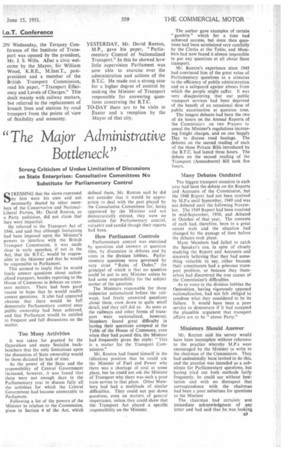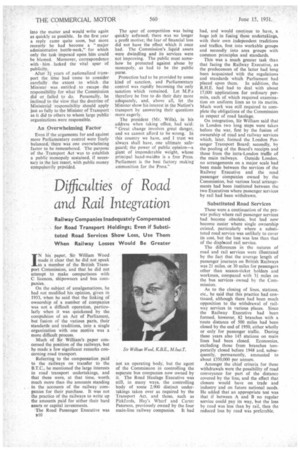"The Major Administrative Bottleneck"
Page 43

Page 44

If you've noticed an error in this article please click here to report it so we can fix it.
Strong Criticism of Undue Limitation of Discussions on State Enterprises: Consultative Committees No Substitute for Parliamentary Control
SrRESS1NG that the views expressed by him were his own and not necessarily shared by other members of the Conservative and NationalLiberal Parties, Mr. David Renton, as a Party politician, did not claim that they were impartial.
He referred to the Transport Act of 1946. and said that although limitations had been imposed upon the Minister's powers to interfere with the British Transport Commission, it was made clear in early speeches, if not in the Act, that the B.T.C. would be responsible to the Minister and that he would be responsible to Parliament. This seemed to imply that he would freely answer questions about nationalized transport, besides reporting to the House of Commons in debates on transport matters. There had been good reason to hope that he would readily answer questions. It also had appeared obvious that there would be full democratic Parliamentary control once public ownership had been achieved, and that Parliament would be entitled to frequent and full discussions on the matter.
Too Many Activities
It was taken for granted by the Opposition and many Socialist backbenchers that the only limitations upon the discussion of State ownership would be those dictated by lack of time.
As the power of the State and the responsibility of Central Government increased, however, it was found that there were not enough days in the Parliamentary year to discuss fully all the activities for which the Central Government had become answerable to Parliament.
Following a list of the powers of the Minister in relation to the Commission, given in Section 4 of the Act, which
defined them, Mr. Renton said he did not consider that it would be appropriate to deal with the part played by the Consultative Committees for, being appointed by the Minister and not democratically elected, they were no substitute for Parliamentary control, valuable and candid though their reports had been.
How Parliament Controls
Parliamentary control was exercised by questions and answers at question time, by discussion in debates and by votes in the division lobbies. Parliamentary questions were governed by very strict "Rules of Order," the principal of which is that no question could be put to any Minister unless he had some responsibility for the subject matter of the question.
The Ministers responsible for those industries nationalized before the railways, had freely answered questions about them, even down to quite small detail, and they still did so. As soon as the railways and other forms of transport were nationalized, however, Members found great difficulty in having their questions accepted at the Table of the House of Commons; even when they had passed this, the Minister had frequently given the reply: "This is a matter for the Transport Commission."
Mr. Renton had found himself in the ridiculous position that he could ask the Minister of Fuel and Power why there was a shortage of coal at some place, but he could not ask the Minister of Transport why there was such a poor train service to that place. Other Members had had a multitude of similar difficulties. They could not put down questions, even on matters of general importance, unless they could show that the Transport Act placed a specific responsibility on the Minister.
The author gave examples of certain "gambits" which for a time had achieved success, but since then questions had been scrutinized very carefully by the Clerks at the Table, and Members had now found it almost impossible to put any questions at all about State transport.
Mr. Renton's experience since 1945 had convinced him of the great value of Parliamentary questions as a stimulus to the efficiency of public administration and as a safeguard against abuses from which the people might suffer. It was very disappointing that our public transport services had been deprived of the benefit of an occasional dose of public examination at question time.
The longest debates had been the two of six hours on the Annual Reports of the Commission on two Prayers to annul the Minister's regulations increasing freight charges, and on one Supply Day to discuss road haulage. The debates on the second reading of each of the three Private Bills introduced by the B.T.C. had lasted three hours. The debate on the second reading of the Transport (Amendment) Bill took five hours.
Many Debates Outdated
The biggest transport occasion in each year had been the debate on the Reports and Accounts of the Commission, but the 1948 Report had not been received by M.P.s until September, 1949 and was not debated until the following November. The 1949 Report had been received in mid-September, 1950, and debated in October of that year. The contents of each had, therefore, been to a great extent stale and the situation had changed by the passage of time before the debates took place.
Many Members had failed to catch the Speaker's eye, in spite of closely studying the Report and Accounts and sincerely believing that they had something valuable to say, either because their constituents had a grievous transport problem, or because they themselves had discovered the true causes of the Commission's difficulties.
As to votes in the division lobbies the Opposition, having vigorously opposed nationalization, had not felt obliged to condone what they considered to be its failure. It would have been a poor service to democracy if it had accepted the plausible argument that transport affairs are to be " above Party."
Ministers Should Answer
Mr. Renton said his survey would have been incomplete without reference to the practice whereby M.P.s were encouraged by the Minister to write to the chairman of the Commission. They had undoubtedly been invited to do this, and the practice was intended as a substitute for Parliamentary questions, but having tried out both methods fairly frequently, he could say without hesitation and with no disrespect that correspondence with the chairman had been a poor substitute for questions to the Minister The chairman had certainly sent immediate acknowledgment of any letter and had said that he was looking into the matter and would write again as quickly as possible. In the first year a reply came quite soon, but more recently he had become a "major administrative bottle-neck," for which only the task imposed upon him could be blamed. Moreover, correspondence with him lacked the vital spur of publicity, After 3! years of nationalized transport the time had come to consider carefully the extent to which the Minister was entitled to escape the responsibility for what the Commission did or failed to do. Personally, he inclined to the view that the doctrine of Ministerial responsibility should apply just as fully to the Minister of Transport as it did to others to whom large public organizations were responsible.
An Overwhelming Factor
Even if the arguments for and against more Parliamentary control were finely balanced. there was one overwhelming factor to be remembered. The purpose of the Transport Act was to establish a public monopoly sustained, if necessary in the last resort, with public money compulsorily provided. The spur of competition was being quickly softened; there was no longer a profit motive; the fear of financial loss did not have the effect which it once had. The Commission's liquid assets were dwindling and its services were not improving. The public must somehow be protected against abuse by monopoly, as had to be the public purse.
Protection had to be provided by some kind of sanction, and Parliamentary control was rapidly becoming the only sanction which remained. Let M.P.s therefore be free to do their duty more adequately, and, above all, let the Minister show his interest in the Nation's transport by answering their questions more eagerly.
The president (Mr. Wills), in his address when taking office, had said; "Great change involves great danger, and we cannot afford to be wrong. In this country we have, and I trust we always shall have, one ultimate safeguard; the power of public opinion—a giant of imponderable weight, whose principal hand-maiden is a free Press. Parliament is the best factory making ammunition for the Press."




























































































